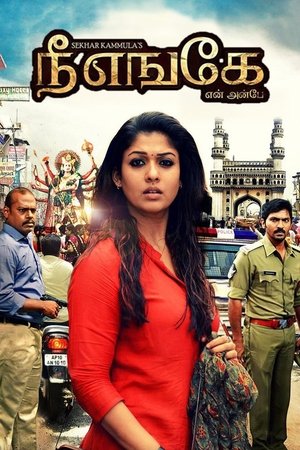
Anaamika
Let's cut to the chase. If you have seen Kahaani, you will find Nee Enge En Anbe underwhelming. That Sekhar Kammula is not interested in a frame-by-frame remake of Sujoy Ghosh's film and wants to stamp his fingerprints over this film is established the moment he introduces his heroine. Unlike Vidya Bagchi in Kahaani, Anamika, here, is not a pregnant woman to instantly earn our empathy and trust; she is an ordinary young woman who claims to have come from the US to India (Hyderabad, in particular) in search of her missing husband, Ajay Swaminathan. It shows that the director isn't worried about putting himself in a tighter spot and is willing to do his share of heavy lifting. In fact, he effectively shows how such a young woman could also be vulnerable — one cop wants her to share his bed in exchange for information on her husband, while another berates her and blames her after noticing that she has failed to button up her top. Anamika is helped by Parthasarathy ( Vaibhav), the only Tamilian in the police station, who develops a crush of sorts over her. Meanwhile, she is told by encounter specialist Amjad Ali Khan that Ajay is actually Milan Damji, a terrorist, who masterminded a horrifying bomb blasts months earlier. Anamika refuses to accept it as she sees this as a cover-up by the police to hide their inefficiency. Meanwhile, a hit man is murdering the people she had gone to asking for help, and everyone is interested in a hard drive that could be the key to solving the whole mystery. While the audacity to deviate from the original is appreciable, the deviations that Kammula and his co-writer Sai Prasad bring in to the basic plot of the original are what, sadly, let this film down. The Hindi version was essentially an elaborate act of cinematic rug-pulling and yet, it always felt plausible (at least while we were watching it) and also explained the hows and whys in a convincing manner. Here, the final reveal only leaves us with more questions that need answers — from how did Anamika realize the true nature of the villain to why do the cops, led by Khan, never discuss the possibility of capturing Milan Damji alive and why do the terrorists, knowing that she's on to them, leave Anamika alive (bafflingly, we are even shown a flashback of Damji murdering a woman who had identified him in the past). The film's setting doesn't help as well. It is understandable that the filmmakers decided to set the film in Hyderabad as they were making a Tamil-Telugu bilingual but it alienates the Tamil viewer because we are never truly able to get the local flavour, despite the rousing score in the climatic Durga puja and the numerous zoom outs that Kammula resorts to show us the teeming locality in which Anamika stays. The lengthy Telugu and Hindi dialogues become too much of a strain beyond a point. The mismatched lip sync in scenes when we can make out the actors speaking in Telugu doesn't help either. There is even a laugh-out-loud instance when Sarathy, who is chasing the hit man, tells him, 'Aye nillu, odaathe'! The performances, too, are just functional. Nayanthara, especially, doesn't internalize Anamika and fails to provide the character the minute shades that Vidya Balan gave to her Vidya Bagchi. So, be it when she is pleading with an Imam to provide some information or while running away from a cop who tries to feel her up or when facing a hit man on her doorstep, her acting seems all surface. The one scene where she does score is when she takes on Pasupathy and we are able to feel the character's righteous anger. Even here, she is overshadowed by Pasupathy who is very good in a role that isn't as clearly drawn as Nawazuddin Siddiqui's Khan in the original. The actor is all fire and brimstone initially during the scene, taking out his anger and frustration at not being able to capture Milan Damji on Anamika but once he sees it in her eyes that she is genuine (after her outburst), he mellows down in a manner that is remarkable.
